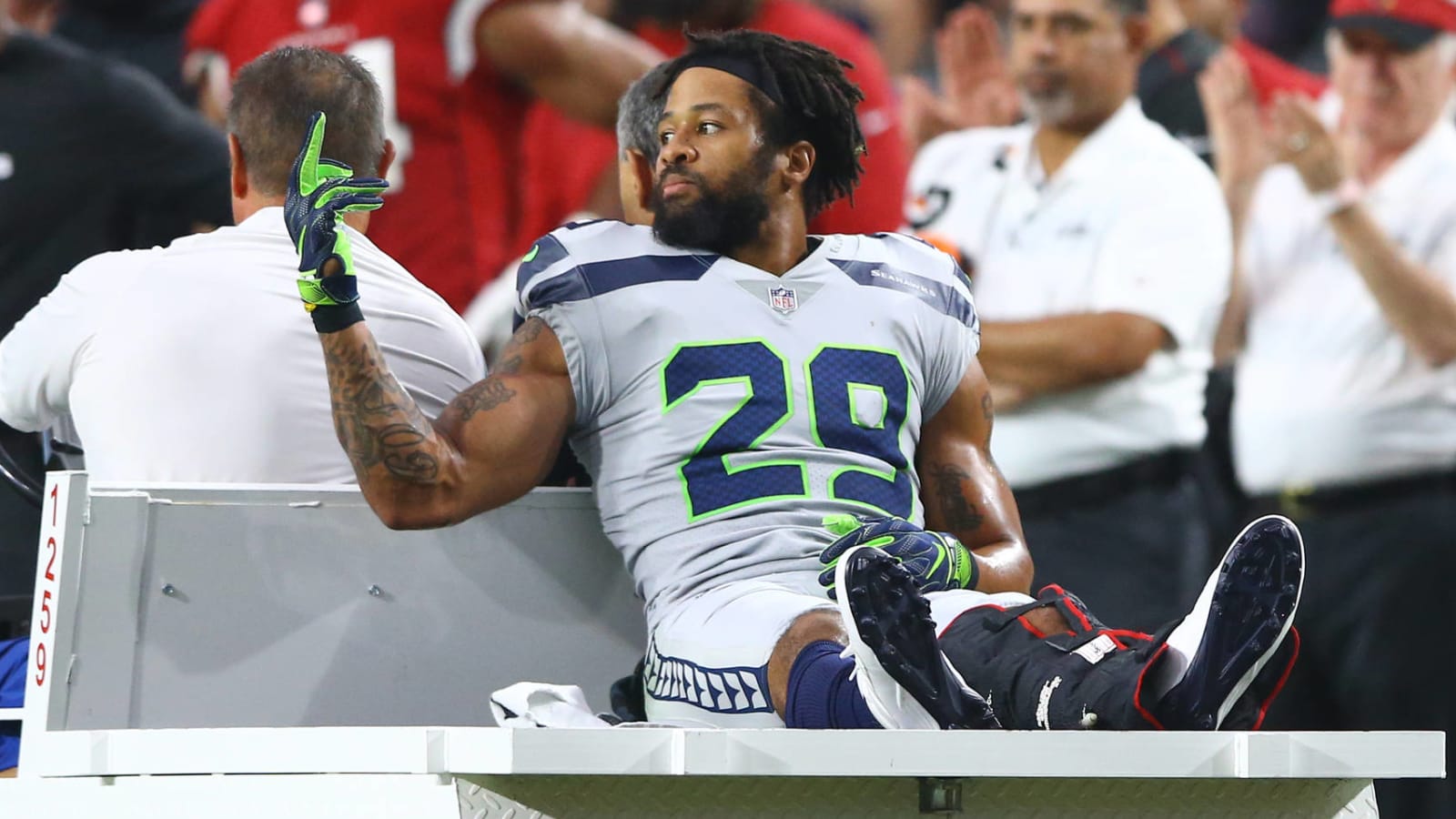
Earl Thomas' gesture was a refutation of the NFL's team-first culture
Conventional NFL fandom ties people to organizations. Perhaps saying fans who favor teams first and foremost are “just rooting for laundry” is a little glib, but it does drive at a point that fans often disregard what’s best — or even fair — for the players. And if the fans don’t care, there’s nothing holding the teams and their owners to the fire either.
Even in fantasy football, when players are mostly divorced from the teams they play for, they’re still just cogs distilled to pure production. It’s not unheard of for fans to follow individual athletes, but it’s the exception to the norm. The public is programmed to see players as commodifiable cogs, only deserving of concern insofar that they’re helping our teams, real or fantasy.
So it shouldn’t be surprising that Earl Thomas flipping off his own sideline as he was carted off the field after breaking his leg has raised the hackles of quite a few insiders — who benefit from enforcing the status quo. Just hours after it happened, Thomas was being lectured by Tony Dungy and Rodney Harrison for, in their view, not handling the situation well.
Oh cool, Earl Thomas is getting lectured now pic.twitter.com/seMKsXBwHe
— Adam Stites (@AdamStites_) October 1, 2018
Dungy and Harrison, of course, both played the game and have bought in to the “organization-first” mentality that pervades the sport. Harrison achieved his greatest fame with the Patriots, and no franchise better exemplifies the idea that players are expendable than the Pats. That they’ve had the most on-field success over the last 20 years has served to solidify in the minds of fans the idea that actually doing right by athletes is counterproductive and wrong.
Thomas’ gesture didn’t come out of nowhere. The All-Pro safety had an offseason-long holdout that he only ended the first week of September with a message on Instagram that the “disrespect has been well noted and will not be forgotten.” He was referring, naturally, to the lack of a new long-term contract with the Seahawks. 2018 marks the final year of a four-year, $40 million extension he signed in 2014. Thomas has seen the writing on the wall with the Seahawks for some time. Following a December 2017 game against the Cowboys, Thomas attempted to enter the Dallas locker room and told head coach Jason Garrett “when Seattle kicks me to the curb, come get me.” Seattle wouldn’t trade him, nor would the Seahawks reward one of the fixtures of their championship-winning defense with a new deal. Despite all he did to build them into a winner, they were willing to jeopardize his long-term earning potential in one last season.
The Cowboys will indeed have a chance to "go get" Thomas following this year. Even if they do, though, it will almost certainly be for significantly less money than Thomas would have gotten if he landed another long-term deal before the season. In 2019, he will be a 30-year-old safety coming off a season-ending leg injury. He won’t exactly be done, but it’s unlikely he’ll be paid anything commensurate to his worth.
This is why star players have been increasingly vocal about their insistence on secure, long-term deals. Kirk Cousins got a fully guaranteed three-year contract but only after enduring back-to-back seasons in Washington in which he was pinned under the franchise tag. Sure, each of those individual seasons paid well. Had Cousins been felled with a serious injury as Thomas was on Sunday, then his value would have tanked the following year, and he would most likely have had to take a multiyear deal at a deep discount.
This gets to why Le’Veon Bell has continued his holdout well into the regular season. The report is that Bell is planning to report to the Steelers in Week 7, but he’s made his point that he’s not willing to take the same dangerous risk as Cousins, especially when his is a position that takes more regular punishment and has a shorter average shelf life.
It's little coincidence, then, that Bell applauded Thomas for his gesture on Sunday.
Le'Veon Bell chimes in on Earl Thomas' injury. pic.twitter.com/cmMbaezpRA
— Adam Schefter (@AdamSchefter) October 1, 2018
Holdouts aren’t anything new. There is, however, an increasingly open acceptance among players that teams don’t play fair with their livelihoods and certainly don’t have their best interests in mind. Bell and Thomas are just leading the way. If you listen to how the NFL is covered in most major outlets, the main concern is how teams will be able to cope with salary demands and how a particular player fits within the cap. There’s far less discussion of contracts with little to no guarantees and how teams can break deals freely while players seldom have the option.
Honest members of the media are open about how contracts are almost always team-friendly and full of fake money. Why should players have to keep up the charade that anyone is willing to do right by them? When a player is cut unceremoniously, there’s a tired refrain of, “Oh, well, this is a business.” So why should a player not be able to show frustration, even in a slightly profane way? If seeing Thomas flick off his own sideline is the sort of shock someone needs to realize teams have all the power and never use it judiciously with players, then it was a righteous act.
More must-reads:
- Doug Baldwin defends Thomas over middle finger salute
- Chiefs, Seahawks were reportedly nearing Earl Thomas deal prior to injury
- The 'Legion of Boom goes the dynamite' quiz
Breaking News
Customize Your Newsletter
 +
+
Get the latest news and rumors, customized to your favorite sports and teams. Emailed daily. Always free!

